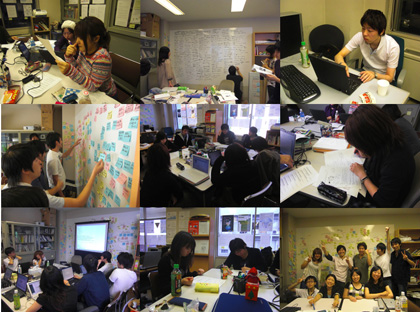2010年度夏季集中 特別研究プロジェクト(井庭 崇)シラバス
今年の夏休み期間中に、以下の「特別研究プロジェクト」を実施します。夏季期間集中の研究プロジェクト科目(2単位)としての正式な開講です。なお、2010年春学期/秋学期の井庭研究会履修者以外の参加も歓迎です。
特別研究プロジェクト(井庭 崇)シラバス
「Creative Systems Lab(特別編):『学習パターン』英語版の制作」
■ 実施期間
2010年9月6日(月)〜13日(月)
■ 参加エントリー
7月19日(月)までに、後述のエントリー情報をメールで提出してください。
■ 目的・内容
本特別研究プロジェクトでは、全体性をうまく取り込んだ問題解決/デザインのコツを記述するための「パターン・ランゲージ」の方法論と思想を踏まえ、実際にひとつのパターン・ランゲージの記述に取り組みます。今回制作するのは、「SFCらしい学びのデザイン」を支援するためのパターン・ランゲージである「学習パターン」(Learning Patterns)の英語版です。この英語版制作では、日本語版を単に英訳するというレベルではなく、自然な言葉や言い回し、共感を生みやすい書き方になるような意訳が必要となります。また、パターン・ランゲージとしての記述のクオリティを上げるため、建築や組織論における先行事例を読み込み、その記述を参考にしながら制作していきます。
■ 履修条件
1. 英語である程度の読み書きができること。
2. 事前課題(あらかじめ文献を読んで内容をまとめるというもの。詳細はエントリー者にお伝えします)を9月上旬の指定期日までに提出すること。
■評価方法
制作活動における参加・貢献の度合い、および、プロジェクト終了時の振り返りのレポートから評価します。
■ 予定受け入れ人数
10人程度
■ 参加エントリー
履修希望者は、7月19日(月)までに、以下の情報をメールで担当教員 井庭 崇(iba [atmark] sfc.keio.ac.jp)宛に送ってください。秋学期の井庭研にもエントリーする人は、それぞれのエントリーを別メールで提出してください。大学院生など正規履修できない場合でも、その旨を明記し、同様にエントリーしてください。
1. 名前(+ふりがな)
2. メールアドレス
3. 学部・学年
4. 英語力のレベルについて
5. 自己紹介
メール件名:特別研究プロジェクトエントリー(姓名)
■ 重要参考文献
【学習パターン】
『Learning Patterns: A Pattern Language for Active Learners at SFC 2009』(学習パターンプロジェクト, 慶應義塾大学総合政策学部・環境情報学学部, 2009)※ http://learningpatterns.sfc.keio.ac.jp/ よりPDFをダウンロードできる。
「自生的秩序の形成のための《メディア》デザイン──パターン・ランゲージは何をどのように支援するのか?」(井庭 崇, 『10+1 web site』, 2009年9月号)
"Learning Patterns: A Pattern Language for Active Learners" (Takashi Iba, et. al., 16th PLoP, 2009)
"Learning Patterns: A Pattern Language for Creative Learners II" (Takashi Iba and Toko Miyake, 1st Asian PLoP, 2010)
【他分野のパターン・カタログ】
A Pattern Language: Town Building, Consruction (C. Alexander, et. al., Oxford University Press, 1977)
Fearless Change: Patterns for Introducing New Ideas (Mary Lynn Manns, Linda Rising, Addison-Wesley Professional, 2005)
"Pools of Insight: A Pattern Language for Study Groups" (Joshua Kerievsky, Version: 0.9, Updated: July 1, 1999)
【パターン・ランゲージの思想・方法】
The Timeless Way of Building (C. Alexander, Oxford University Press, 1979)
『パターン、Wiki、XP :時を超えた創造の原則』(江渡 浩一郎, 技術評論社, 2009)
「コミュニケーションの連鎖による創造とパターン・ランゲージ」(井庭 崇, 社会・経済システム, 2007)
The Patterns Handbook: Techniques, Strategies, and Applications (Linda Rising (ed), Cambridge University Press, 1998)
■ 問い合わせ/連絡先
iba [atmark] sfc.keio.ac.jp

特別研究プロジェクト(井庭 崇)シラバス
「Creative Systems Lab(特別編):『学習パターン』英語版の制作」
■ 実施期間
2010年9月6日(月)〜13日(月)
■ 参加エントリー
7月19日(月)までに、後述のエントリー情報をメールで提出してください。
■ 目的・内容
本特別研究プロジェクトでは、全体性をうまく取り込んだ問題解決/デザインのコツを記述するための「パターン・ランゲージ」の方法論と思想を踏まえ、実際にひとつのパターン・ランゲージの記述に取り組みます。今回制作するのは、「SFCらしい学びのデザイン」を支援するためのパターン・ランゲージである「学習パターン」(Learning Patterns)の英語版です。この英語版制作では、日本語版を単に英訳するというレベルではなく、自然な言葉や言い回し、共感を生みやすい書き方になるような意訳が必要となります。また、パターン・ランゲージとしての記述のクオリティを上げるため、建築や組織論における先行事例を読み込み、その記述を参考にしながら制作していきます。
■ 履修条件
1. 英語である程度の読み書きができること。
2. 事前課題(あらかじめ文献を読んで内容をまとめるというもの。詳細はエントリー者にお伝えします)を9月上旬の指定期日までに提出すること。
■評価方法
制作活動における参加・貢献の度合い、および、プロジェクト終了時の振り返りのレポートから評価します。
■ 予定受け入れ人数
10人程度
■ 参加エントリー
履修希望者は、7月19日(月)までに、以下の情報をメールで担当教員 井庭 崇(iba [atmark] sfc.keio.ac.jp)宛に送ってください。秋学期の井庭研にもエントリーする人は、それぞれのエントリーを別メールで提出してください。大学院生など正規履修できない場合でも、その旨を明記し、同様にエントリーしてください。
1. 名前(+ふりがな)
2. メールアドレス
3. 学部・学年
4. 英語力のレベルについて
5. 自己紹介
メール件名:特別研究プロジェクトエントリー(姓名)
■ 重要参考文献
【学習パターン】
【他分野のパターン・カタログ】
【パターン・ランゲージの思想・方法】
■ 問い合わせ/連絡先
iba [atmark] sfc.keio.ac.jp

井庭研だより | - | -